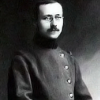Max Stirner

Max Stirner
Johann Kaspar Schmidt, better known as Max Stirner, was a German philosopher. He is often seen as one of the forerunners of nihilism, existentialism, psychoanalytic theory, postmodernism, and anarchism, especially of individualist anarchism. Stirner's main work is The Ego and Its Own, also known as The Ego and His Own. This work was first published in 1845 in Leipzig, and has since appeared in numerous editions and translations...
NationalityGerman
ProfessionPhilosopher
Date of Birth25 October 1806
CountryGermany
What I have in my power, that is my own. So long as I assert myself as holder, I am the proprietor of the thing.
Is not all the stupid chatter of most of our newspapers the babble of fools who suffer from the fixed idea of morality, legality, christianity and so forth, and only seem to go about free because the madhouse in which they walk takes in so broad a space?
The moral man is necessarily narrow in that he knows no other enemy than the immoral man. He who is not moral is immoral! and accordingly reprobate, despicable, etc. Therefore, the moral man can never comprehend the egoist.
The truth wears longer than all the gods; for it is only in the truth's service, and for love of it, that people have overthrown the gods and at last God himself. "The truth" outlasts the downfall of the world of gods, for it is the immortal soul of this transitory world of gods; it is Deity itself.
Before what is sacred, people lose all sense of power and all confidence; they occupy a powerless and humble attitude toward it. And yet no thing is sacred of itself, but by my declaring it sacred, by my declaration, my judgment, my bending the knee; in short, by my conscience.
The young are of age when they twitter like the old; they are driven through school to learn the old song, and, when they have this by heart, they are declared of age.
The State has always one purpose: to limit, control, subordinate the individual and subject him to the general purpose Through its censorship, its supervision, and its police the State tries to obstruct all free activity and sees this repression as its duty, because the instinct of self-preservation demands it. The State does not permit me to use my thoughts to their full value and communicate them to other men unless they are its own Otherwise it shuts me up.
Where the world comes in my way - and it comes in my way everywhere - I consume it to quiet the hunger of my egoism. For me you are nothing but - my food, even as I too am fed upon and turned to use by you. We have only one relation to each other, that of usableness, of utility, of use. We owe each other nothing, for what I seem to owe you I owe at most to myself. If I show you a cheery air in order to cheer you likewise, then your cheeriness is of consequence to me, and my air serves my wish; to a thousand others, whom I do not aim to cheer, I do not show it.
When every one is to cultivate himself into man, condemning a man to machine-like labor amounts to the same thing as slavery. If a factory-worker must tire himself to death twelve hours and more, he is cut off from becoming man. Every labor is to have the intent that the man be satisfied.... His labor is nothing taken by itself, has no object in itself, is nothing complete in itself; he labors only into another's hands, and is used (exploited) by this other.
I say: liberate yourself as far as you can, and you have done your part; for it is not given to every one to break through all limits, or, more expressively, not to everyone is that a limit which is a limit for the rest. Consequently, do not tire yourself with toiling at the limits of others; enough if you tear down yours. [...] He who overturns one of his limits may have shown others the way and the means; the overturning of their limits remains their affair.
Freedom cannot be granted. It must be taken.
We don't call it sin today, we call it self-expression.
The habit of the religious way of thinking has biased our mind so grievously that we are - terrified at ourselves in our nakedness and naturalness; it has degraded us so that we deem ourselves depraved by nature, born devils.
Whoso is full of sacred (religious, moral, humane) love loves only the spook, the "true man," and persecutes with dull mercilessness the individual, the real man.